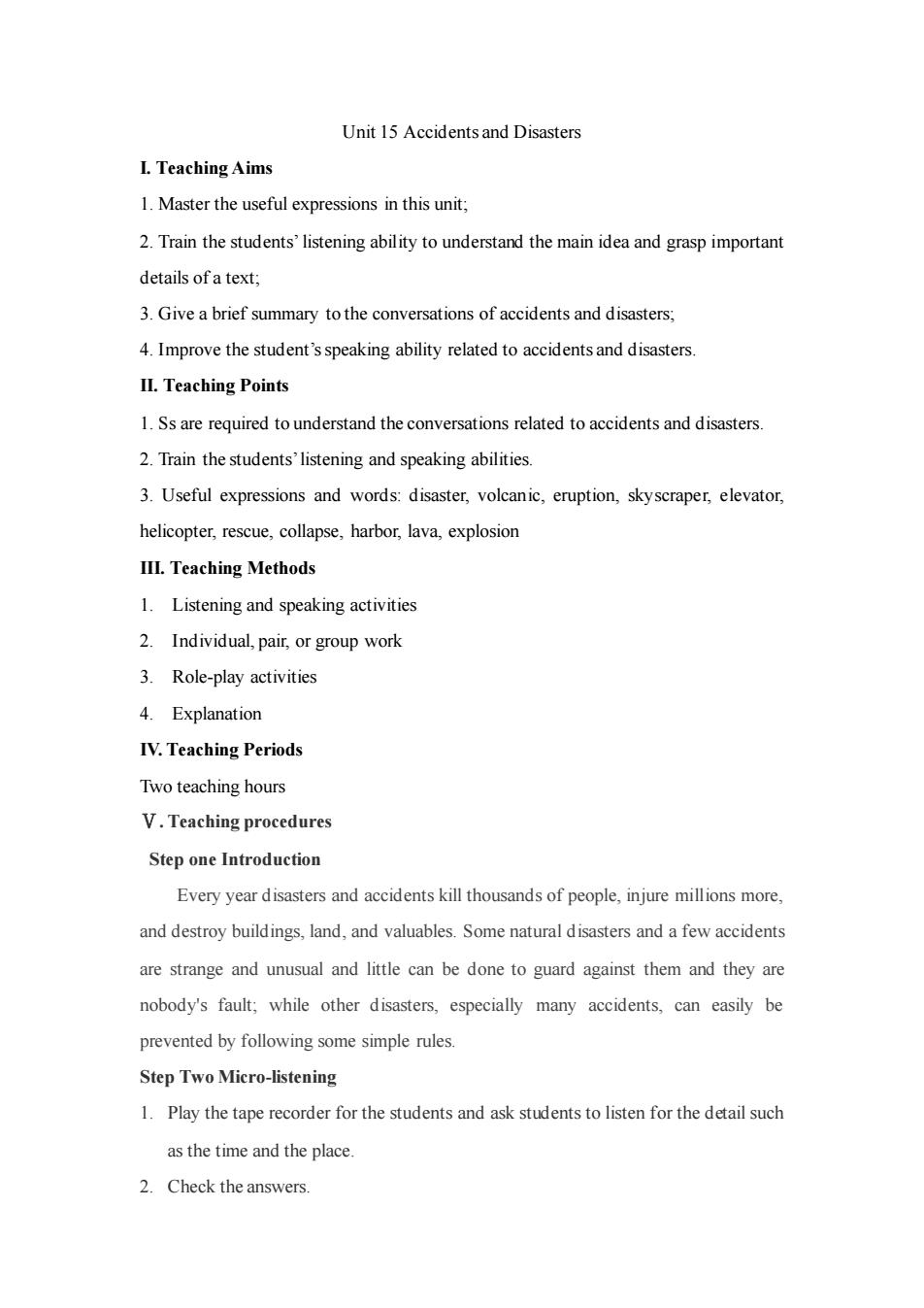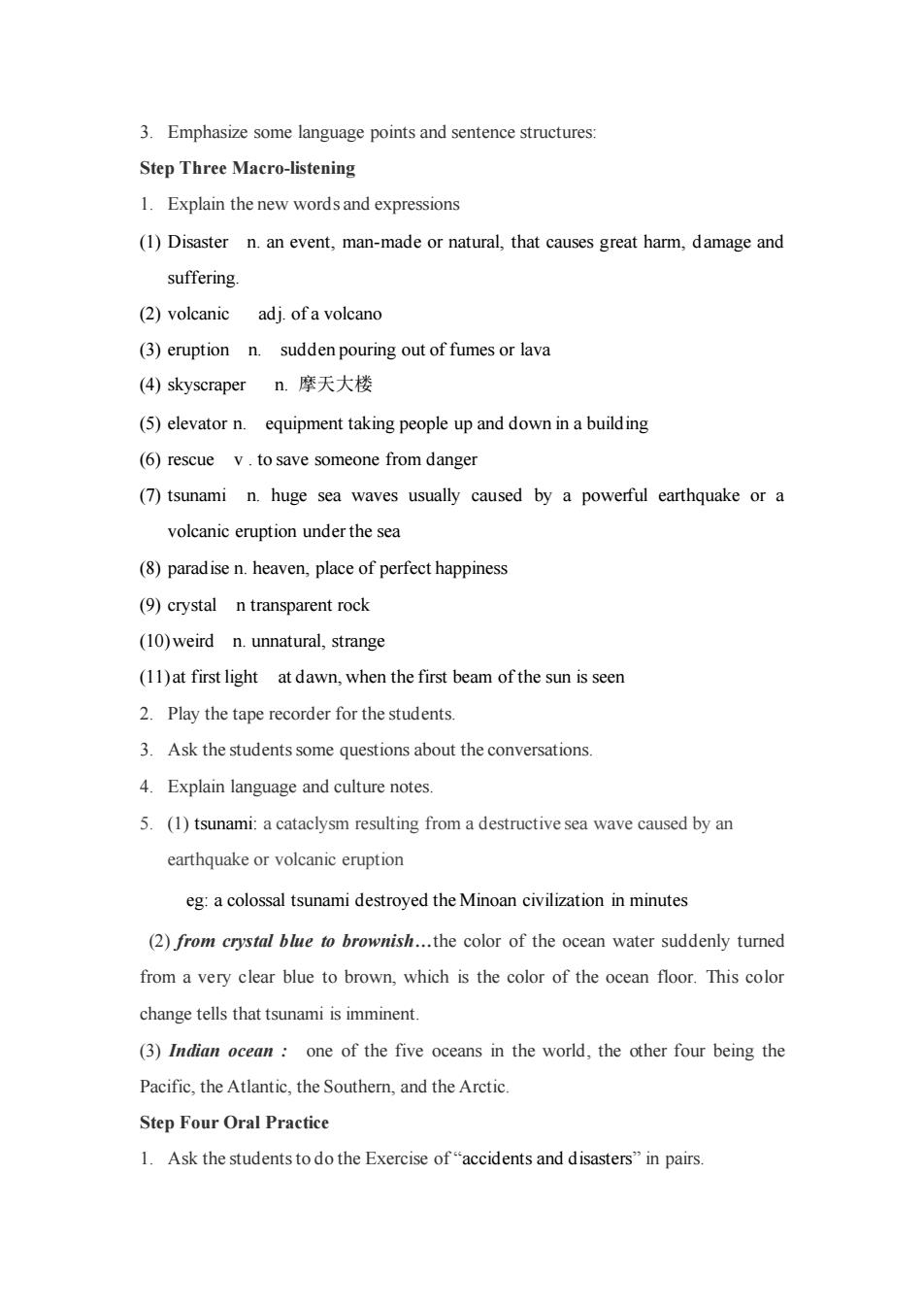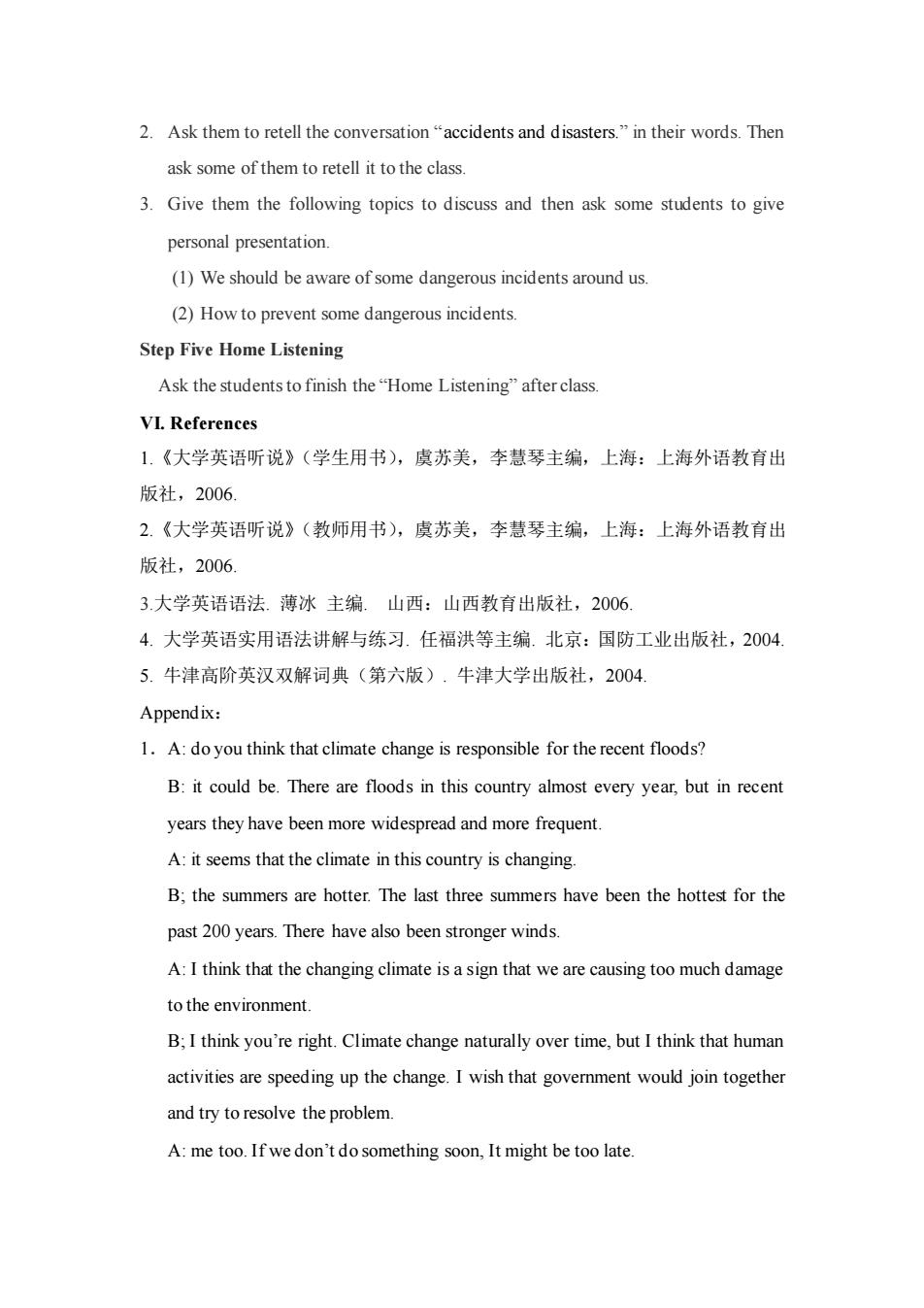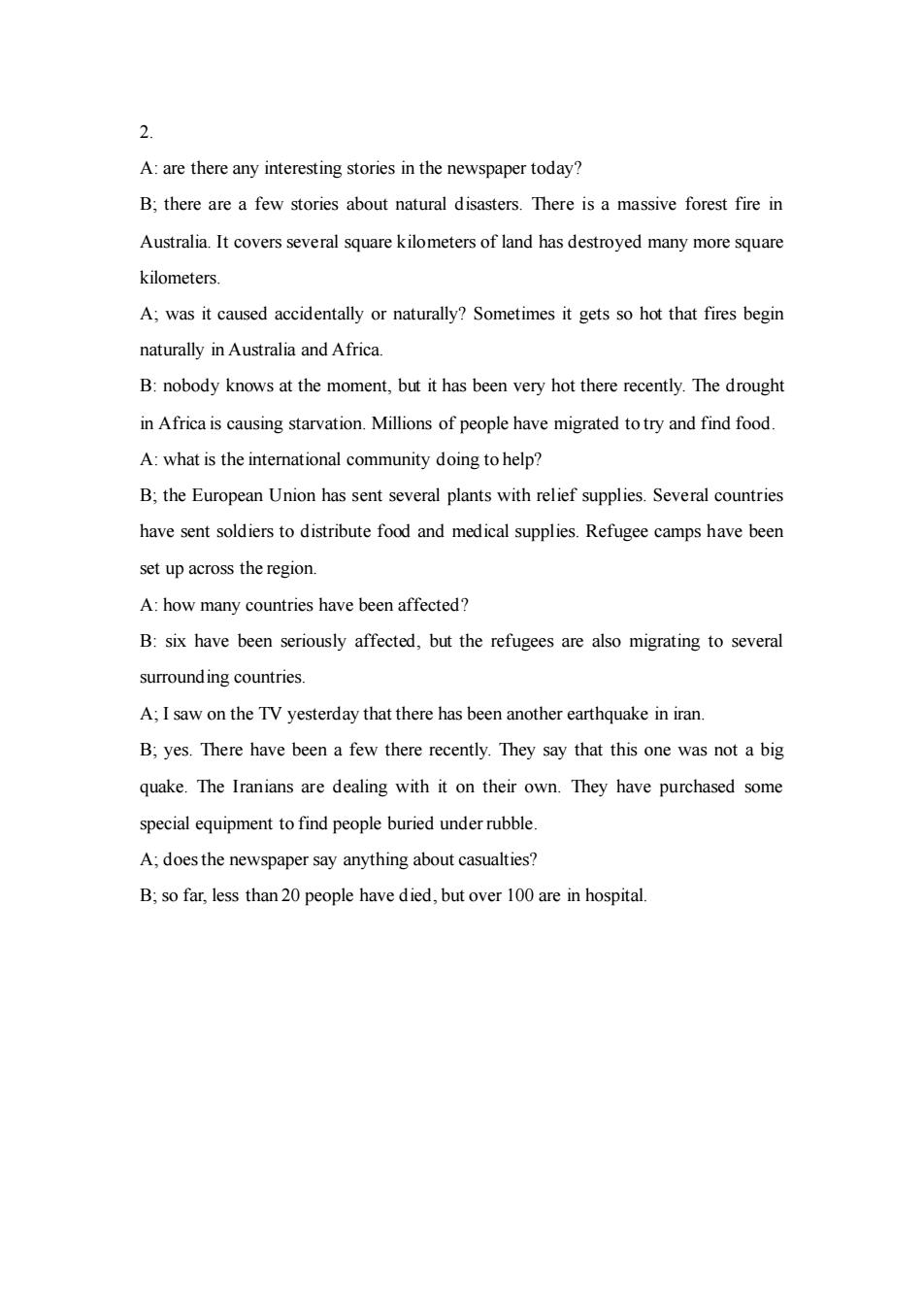
Unit 15 Accidents and Disasters LTeaching Aims 1.Master the useful expressions in this unit. 2.Train the students'listening ability to understand the main idea and grasp important details ofa text: 3.Give a brief summary to the conversations of accidents and disasters. 4.Improve the student's speaking ability related to accidents and disasters II.Teaching Points 1.Ss are required to understand the conversations related to accidents and disasters. 2.Train the students'listening and speaking abilities. 3.Useful expressions and words:disaster,volcanic,eruption,skyscraper,elevator. helicopter,rescue,collapse,harbor,lava,explosion III.Teaching Methods 1.Listening and speaking activities 2.Individual,pair,or group work 3.Role-play activities 4.Explanation IV.Teaching Periods Two teaching hours V.Teaching procedures Step one Introduction Every year disasters and accidents kill thousands of people,injure millions more, and destroy buildings,land,and valuables.Some natural disasters and a few accidents are strange and unusual and little can be done to guard against them and they are nobody's fault:while other disasters,especially many accidents,can easily be prevented by following some simple rules. Step Two Micro-listening 1.Play the tape recorder for the students and ask students to listen for the detail such as the time and the place 2.Check the answers
Unit 15 Accidents and Disasters I. Teaching Aims 1. Master the useful expressions in this unit; 2. Train the students’ listening ability to understand the main idea and grasp important details of a text; 3. Give a brief summary to the conversations of accidents and disasters; 4. Improve the student’s speaking ability related to accidents and disasters. II. Teaching Points 1. Ss are required to understand the conversations related to accidents and disasters. 2. Train the students’ listening and speaking abilities. 3. Useful expressions and words: disaster, volcanic, eruption, skyscraper, elevator, helicopter, rescue, collapse, harbor, lava, explosion III. Teaching Methods 1. Listening and speaking activities 2. Individual, pair, or group work 3. Role-play activities 4. Explanation IV. Teaching Periods Two teaching hours Ⅴ. Teaching procedures Step one Introduction Every year disasters and accidents kill thousands of people, injure millions more, and destroy buildings, land, and valuables. Some natural disasters and a few accidents are strange and unusual and little can be done to guard against them and they are nobody's fault; while other disasters, especially many accidents, can easily be prevented by following some simple rules. Step Two Micro-listening 1. Play the tape recorder for the students and ask students to listen for the detail such as the time and the place. 2. Check the answers

3.Emphasize some language points and sentence structures: Step Three Macro-listening 1.Explain the new words and expressions (1)Disaster n.an event,man-made or natural,that causes great harm,damage and suffering. (2)volcanic adj.ofa volcano (3)eruption n.suddenpouring out of fumes or lava (4)skyscraper n.摩天大楼 (5)elevator n.equipment taking people up and down in a building (6)rescue v.to save someone from danger (7)tsunami n.huge sea waves usually caused by a powerful earthquake or a volcanic eruption under the sea (8)paradise n.heaven,place of perfect happiness (9)crystal ntransparent rock (10)weird n.unnatural,strange (11)at first light at dawn,when the first beam of the sun is seen 2.Play the tape recorder for the students. 3.Ask the students some questions about the conversations 4.Explain language and culture notes. 5.(1)tsunami:a cataclysm resulting from a destructive sea wave caused by an earthquake or volcanic eruption eg:a colossal tsunami destroyed the Minoan civilization in minutes (2)from crystal blue to brownish...the color of the ocean water suddenly tumned from a very clear blue to brown,which is the color of the ocean floor.This color change tells that tsunami is imminent (3)Indian ocean:one of the five oceans in the world,the other four being the Pacific,the Atlantic,the Southemn,and the Arctic. Step Four Oral Practice 1.Ask the studentsto do the Exercise of"accidents and disasters"in pairs
3. Emphasize some language points and sentence structures: Step Three Macro-listening 1. Explain the new words and expressions (1) Disaster n. an event, man-made or natural, that causes great harm, damage and suffering. (2) volcanic adj. of a volcano (3) eruption n. sudden pouring out of fumes or lava (4) skyscraper n. 摩天大楼 (5) elevator n. equipment taking people up and down in a building (6) rescue v . to save someone from danger (7) tsunami n. huge sea waves usually caused by a powerful earthquake or a volcanic eruption under the sea (8) paradise n. heaven, place of perfect happiness (9) crystal n transparent rock (10)weird n. unnatural, strange (11)at first light at dawn, when the first beam of the sun is seen 2. Play the tape recorder for the students. 3. Ask the students some questions about the conversations. 4. Explain language and culture notes. 5. (1) tsunami: a cataclysm resulting from a destructive sea wave caused by an earthquake or volcanic eruption eg: a colossal tsunami destroyed the Minoan civilization in minutes (2) from crystal blue to brownish…the color of the ocean water suddenly turned from a very clear blue to brown, which is the color of the ocean floor. This color change tells that tsunami is imminent. (3) Indian ocean : one of the five oceans in the world, the other four being the Pacific, the Atlantic, the Southern, and the Arctic. Step Four Oral Practice 1. Ask the students to do the Exercise of “accidents and disasters” in pairs

2.Ask them to retell the conversation"accidents and disasters."in their words.Then ask some of them to retell it to the class. 3.Give them the following topics to discuss and then ask some students to give personal presentation. (1)We should be aware of some dangerous incidents around us. (2)How to prevent some dangerous incidents. Step Five Home Listening Ask the students to finish the"Home Listening"afterclass VI.References 1.《大学英语听说》(学生用书),虞苏美,李慧琴主编,上海:上海外语教有出 版社,2006. 2.《大学英语听说》(教师用书),虞苏美,李慧琴主编,上海:上海外语教育出 版社,2006. 3.大学英语语法.薄冰主编。山西:山西教育出版社,2006 4.大学英语实用语法讲解与练习.任福洪等主编.北京:国防工业出版社,2004 5.牛津高阶英汉双解词典(第六版).牛津大学出版社,2004 Appendix: 1.A:do you think that climate change is responsible for the recent floods? B:it could be.There are floods in this country almost every year,but in recent years they have been more widespread and more frequent. A:it seems that the climate in this country is changing. B:the summers are hotter.The last three summers have been the hottest for the past 200 years.There have also been stronger winds. A:I think that the changing climate is asign that we are causing too much damage to the environment B:I think you're right.Climate change naturally over time,but I think that human activities are speeding up the change.I wish that government would join together and try to resolve the problem A:me too.If we don't do something soon,It might be too late
2. Ask them to retell the conversation “accidents and disasters.” in their words. Then ask some of them to retell it to the class. 3. Give them the following topics to discuss and then ask some students to give personal presentation. (1) We should be aware of some dangerous incidents around us. (2) How to prevent some dangerous incidents. Step Five Home Listening Ask the students to finish the “Home Listening” after class. VI. References 1.《大学英语听说》(学生用书),虞苏美,李慧琴主编,上海:上海外语教育出 版社,2006. 2.《大学英语听说》(教师用书),虞苏美,李慧琴主编,上海:上海外语教育出 版社,2006. 3.大学英语语法. 薄冰 主编. 山西:山西教育出版社,2006. 4. 大学英语实用语法讲解与练习. 任福洪等主编. 北京:国防工业出版社,2004. 5. 牛津高阶英汉双解词典(第六版). 牛津大学出版社,2004. Appendix: 1.A: do you think that climate change is responsible for the recent floods? B: it could be. There are floods in this country almost every year, but in recent years they have been more widespread and more frequent. A: it seems that the climate in this country is changing. B; the summers are hotter. The last three summers have been the hottest for the past 200 years. There have also been stronger winds. A: I think that the changing climate is a sign that we are causing too much damage to the environment. B; I think you’re right. Climate change naturally over time, but I think that human activities are speeding up the change. I wish that government would join together and try to resolve the problem. A: me too. If we don’t do something soon, It might be too late

2 A:are there any interesting stories in the newspaper today? B:there are a few stories about natural disasters.There is a massive forest fire in Australia.It covers several square kilometers of land has destroyed many more square kilometers. A:was it caused accidentally or naturally?Sometimes it gets so hot that fires begin naturally in Australia and Africa. B:nobody knows at the moment,but it has been very hot there recently.The drought in Africa is causing starvation.Millions of people have migrated totry and find food. A:what is the intemational community doing tohelp? B:the European Union has sent several plants with relief supplies.Several countries have sent soldiers to distribute food and medical supplies.Refugee camps have been set up across the region. A:how many countries have been affected? B:six have been seriously affected,but the refugees are also migrating to several surrounding countries. A:I saw on the TV yesterday that there has been another earthquake in iran B:yes.There have been a few there recently.They say that this one was not a big quake.The Iranians are dealing with it on their own.They have purchased some special equipment to find people buried under rubble. A.does the newspaper say anything about casualties? B:so far,less than20 people have died,but over 100 are in hospital
2. A: are there any interesting stories in the newspaper today? B; there are a few stories about natural disasters. There is a massive forest fire in Australia. It covers several square kilometers of land has destroyed many more square kilometers. A; was it caused accidentally or naturally? Sometimes it gets so hot that fires begin naturally in Australia and Africa. B: nobody knows at the moment, but it has been very hot there recently. The drought in Africa is causing starvation. Millions of people have migrated to try and find food. A: what is the international community doing to help? B; the European Union has sent several plants with relief supplies. Several countries have sent soldiers to distribute food and medical supplies. Refugee camps have been set up across the region. A: how many countries have been affected? B: six have been seriously affected, but the refugees are also migrating to several surrounding countries. A; I saw on the TV yesterday that there has been another earthquake in iran. B; yes. There have been a few there recently. They say that this one was not a big quake. The Iranians are dealing with it on their own. They have purchased some special equipment to find people buried under rubble. A; does the newspaper say anything about casualties? B; so far, less than 20 people have died, but over 100 are in hospital